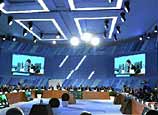
CAIRO, Feb. 17 (Xinhua) -- As Egypt is going through essential changes in internal affairs and pivotal mutation in foreign relations, speculations varied about how far the effect of such changes would influence the relations between Egypt and the United States.
Observers see that Egypt and the United States have strategic alliance based on common interests, believing the United States bases the relations with Egypt on two factors: Israel's security and the Suez Canal.
"As long as the U.S. ships passes through the Suez Canal and there are no threats to Israel's security, Egypt-U.S. ties are stable," Noha Bakr, a political science professor at American University in Cairo, told Xinhua. Despite the pragmatic fact demonstrated by Bakr, other experts believe that some developments may occur and rehash the situation.
One of the major changes in Egypt's foreign policy is the country's gradual restoration of relations with Iran after more than 30 years of rift.
Morsi visited Tehran late August 2012 to attend the Non-aligned Movements (NAM) conference, becoming the first Egyptian president to visit Iran in decades. Similarly, Iranian President Mahmoud Ahmadinejad became the first Iranian president to visit Egypt in over 34 years by his visit to Cairo to attend an Islamic summit earlier this month.
Ahmadinijad said in an interview with the Egyptian TV during his visit that he saw the future Egyptian-Iranian ties "very good, " noting Iran hoped to achieve normal relations with Egypt yet it was not in a hurry.
Sunni Egypt's decision to revive the frozen ties with the Shiite Islamist Republic, some experts believe, would send a wrong message to the United States, which is at odds with Iran due to the latter's nuclear program.
Tarek al-Senouty, Head of political department at al-Ahram newspaper precluded any possibility for Egypt to restore full ties with Iran.
"The United States is an important ally for Egypt and the Egyptian administration knows well that full ties with Iran will annoy the Americans, so resumption of full diplomatic ties is unlikely," al-Senouty said, adding that the Egyptian administration would seek "balance" in its regional and Western relations and would not reconcile with a power at the expense of its ties with another.
However, Bakr touched on the Egyptian-Iranian ties from a different standpoint, believing that the new trend of relations between Egypt and Iran is to "deepen" its relations with the United States.
"The United States is likely to use Egypt as a mediator with Iran, and it will be a mediator accepted from both parties," said Bakr, noting that Egypt can't take Iran as an ally at the expense of its relations with the Unites States, which supported the current administration of President Mohamed Morsi the moment he took office.
"The United States is likely to accept Egypt as a broker in the Iranian issue, just like Palestinian Hamas accepted Egypt as a broker in the Israeli issue," Bakr said.
Another obstacle seemed on the Egypt-U.S. ties is regarding human rights, as U.S. Assistant Secretary for Democracy, Human rights and Labor Michael Posner slammed the human rights situation in Egypt in his recent visit to Cairo.
Posner criticized the tormenting practices by the Egyptian police against the opposition and the peaceful protesters, and expressed Washington's concern about the future of the freedoms in Egypt. "Washington is worried because of the demonstrating law and the Non-Governmental Organizations laws which are being drafted currently," said Posner in a press conference last week, asking the government to respect the international principles for the freedom of gathering and the non-governmental organizations.
Senouty and Bakr agreed that the human rights and freedom issues may upset the U.S. administration but won't affect the bilateral ties as long as the basic strategic interests are on track.
"Morsi gained a big U.S. praise and support can't be easily shaken after he brokered a truce in November that ended a war between Israel and Hamas in control of Gaza strip," Bakr said.
Expecting the United States to continue supporting the current government because it is the first elected one in Egypt's modern history, Bakr saw that the United States wants to present its relations with Egypt as an "example of an Islamic allied state."
Meanwhile, Senouty saw that even if the United States feels anxious about the Egyptian foreign policy or any other issue, it will remain in the stage of "wait and see for a while" before taking any actions.
At a press conference last week in the U.S. embassy in Cairo, Posner said that the U.S. administration "demanded from the congress the economic aids for Egypt". Bakr believes that the continuation of the U.S. economic aids for Egypt in spite of the economic crisis is a testament to Egypt's importance for the U.S. strategic interests in the region.
















 Slacklife in Beijing: China's 'No 1 Slackliner'
Slacklife in Beijing: China's 'No 1 Slackliner'


![]()
